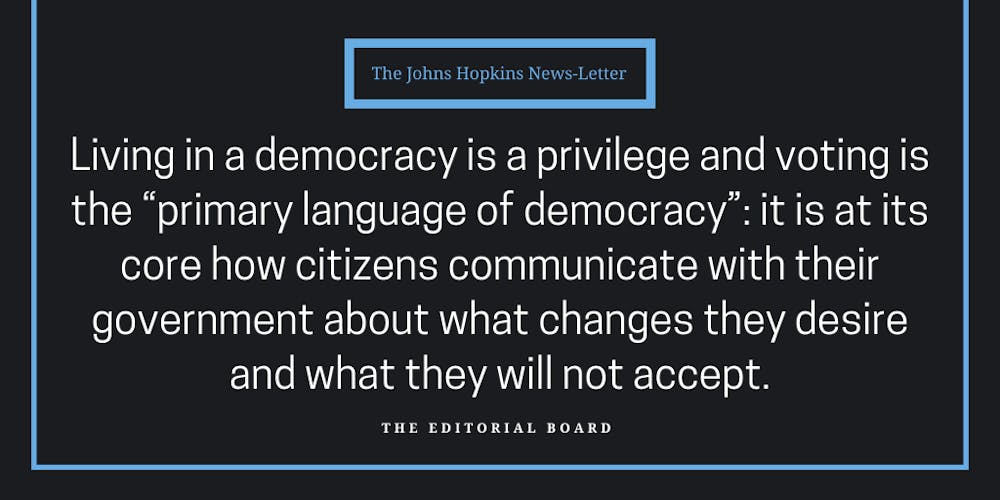Today is National Voter Registration Day. In recognition of the day and the upcoming national election, The News-Letter reflects on the importance of voting and encourages all eligible students to register and make a plan to vote.
Voting is your opportunity to make your voice heard. Living in a democracy is a privilege, and voting is the “primary language of a democracy”: It is, at its core, how citizens communicate with their government about what changes they desire and what they will not accept. Voting allows us to hold politicians accountable for their actions and to determine what kind of future we want.
Our demographic has garnered the reputation of being apathetic to voting. In the last presidential election, 50% of people between 18–29 did not vote, and this was an increase from the 2016 election.
With each individual casting one vote of millions, we understand that voting can often seem insignificant, but some elections are decided by small margins. George Bush famously won the 2000 presidential election by only 537 votes in Florida out of six million votes cast in the state. In 2008, Al Franken defeated his Republican opponent for Senate by just 312 votes out of nearly three million votes cast in California. His victory was a deciding moment and gave Democrats a supermajority in the Senate. The power of an individual vote is even more pronounced in local and state races, where elections can be decided by very slim margins. The local ballot is your opportunity to impact your community and elect representatives aligned with your values.
The value of voting is not only in electing representatives; there is the opportunity to directly change laws through the many state amendments on the ballot this year. For example, constitutional amendments regulating abortion are on the ballot in 10 states, including Maryland.
We understand the frustration some individuals may feel toward voting. There remains a concerted effort by certain political groups to limit voter influence. In 2023, swing states such as Georgia, New Hampshire, North Carolina, and Wisconsin passed laws that make voting more difficult. Further, many states take part in gerrymandering, which refers to manipulating the electoral district boundaries to favor one party and often targets voters of color with surgical precision. College students and those who vote by absentee ballot in particular also face barriers to voting. For example, Missouri, Mississippi, South Dakota, and Oklahoma require absentee ballots to be notarized.
We acknowledge that voting isn’t the end-all method of participating in democracy. Mobilization, protest and advocacy are other forms of civic engagement that matter. Discussion and disagreements are critical to what it means to be a democracy. Yet, voting is unique because it has tangible implications for the makeup of our government. It fundamentally matters who has power and who does not, and many political agendas depend on action by those with power.
The Editorial Board encourages students to register and to make a plan to vote. If you are planning to vote in another state, be sure to request an absentee ballot and be aware that the deadlines vary by state. If you are looking for an envelope and stamps to mail your absentee ballot, you can purchase both at the Wolman Mailroom on campus or the FedEx in Homewood Apartments. The Office of Student Enrollment and Account Management offers a free notary for all University students, faculty and staff, and they can aid in notarizing your ballot if your state requires it. You can book an appointment via their website.
As we get closer to November, consider the issues that matter most to you, and take action by voting.





